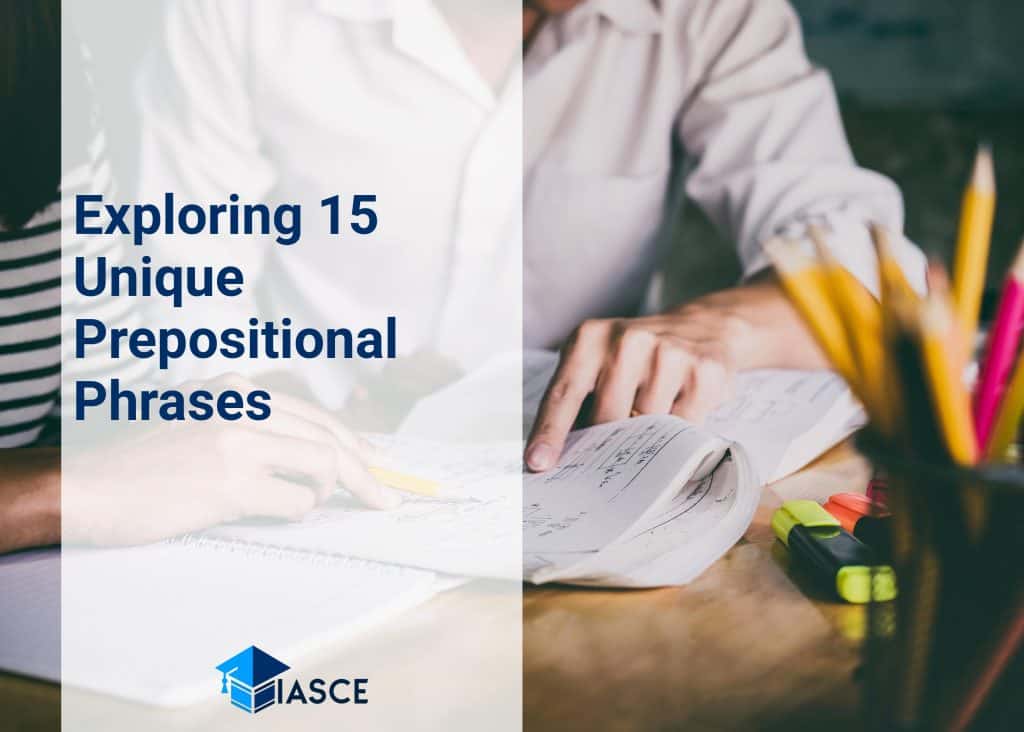I’m about to lift the lid on something we use every day but often overlook: prepositional phrases. These workhorses of the English language may not be glamorous, but they’re pivotal in how we express ourselves. Whether you’re a word enthusiast or just curious, I’ll be unveiling 15 uncommon yet famous prepositional phrases that enrich our conversations and writings.
In our exploration, you’ll discover these phrases aren’t just about “on”, “in”, or “at”. They can be surprisingly diverse, adding depth and nuance to communication. So let’s dive in and enlighten ourselves with these hidden gems of the English language.
Remember, it’s not always about what’s common; sometimes, it’s the rare treasures that add the most value. And who knows? You might even find yourself incorporating these uncommon prepositional phrases into your daily vocabulary!
Diving Deep: Understanding Prepositional Phrases
Let’s unpack the concept of prepositional phrases. It’s a term thrown around in English language discussions, often leaving many perplexed. So, what are they really? Simply put, prepositional phrases are groups of words that begin with a preposition and end with a noun or pronoun.
Now you’re probably wondering: What purpose do these phrases serve? Well, they add extra detail to sentences by telling us more about the location, time, or manner of an action. They’re the secret sauce that adds flavor to our speech and writing!
But don’t just take my word for it. Here’s a table showing some common prepositions paired with different nouns:
|
Preposition |
Noun |
|---|---|
|
In |
room |
|
On |
desk |
|
At |
park |
By adding these together into phrases like “in the room”, “on the desk”, or “at the park”, we can create more descriptive sentences. For example:
-
The keys are in the room.
-
There’s a lamp on the desk.
-
I love to play soccer at the park.
And here’s where it gets even more fascinating—the same prepositional phrase can change meaning based on its placement within a sentence! Consider this pair of examples using “on the chair”:
-
Sitting on the chair, I read my favorite novel.
-
I spilled coffee on the chair.
In Sentence 1, “on the chair” tells us where I am sitting while reading; in Sentence 2, it shows where coffee was spilled.
So there you have it—a sneak peek into understanding prepositional phrases! Remember: they start with a preposition and end with a noun (or pronoun), adding depth and detail to your sentences. Keep exploring them—you’ll uncover an array of possibilities making your communication richer and more engaging!
Step by Step: Breaking Down the 15 Uncommon Prepositions
Let’s dive into this fascinating world of prepositional phrases. Often overlooked, these little gems can add a unique sparkle to our everyday language.
First on our list is “In lieu of.” This phrase essentially means ‘instead of.’ It’s used when you’re substituting one thing for another. For instance, you might say, “I chose tea in lieu of coffee.”
Next up is “On account of.” This simply means ‘because of.’ You’ll see it often in more formal or old-fashioned English. An example would be, “The picnic was canceled on account of rain.”
A third phrase that’s less commonly used but still packs a punch is “In spite of.” This indicates doing something despite adverse conditions. So if you braved the storm and went for your run anyway, you could say: “I went running in spite of the bad weather.”
Here are some other prepositional phrases we’ll be discussing:
-
In accordance with
-
By means of
-
With regard to
-
On behalf of
-
In anticipation of
-
As opposed to
-
In the interest(s) of
-
With respect to
-
In view/as viewed from/of
-
Out (of/from) sight
These phrases may seem daunting at first glance but they’re not as complex as they appear. Take “As opposed to”, for example. It just means ‘as compared to’ or ‘rather than’. So instead saying “I prefer cats rather than dogs,” you’d say, “I prefer cats as opposed to dogs.”
Or consider “With regard to.” This phrase is a polite way to refer back to something previously mentioned without repeating it verbatim. Suppose you’ve been talking about an upcoming vacation and want to change the topic slightly – instead saying “About that trip we were discussing earlier…” you could state “With regard to our conversation earlier…”
These 15 uncommon prepositional phrases help us express ourselves more accurately and eloquently. They may take a bit getting used to but I’m confident that with practice, we’ll start incorporating them into our language naturally.
Conclusion: Demystifying Famous Prepositional Phrases
To wrap things up, we’ve now uncovered fifteen famous prepositional phrases. These versatile linguistic tools have a knack for adding depth and flavor to our everyday language.
I’m sure you’ll agree, it’s intriguing to delve into the mechanics of our language. Peeling back the layers of English grammar reveals its richness and complexity. It gives us new appreciation for something we often take for granted.
Let’s take a quick look at what we’ve learned:
-
Understood the role of prepositions in creating meaningful phrases.
-
Explored examples of common and not-so-common prepositional phrases.
-
Gained insight into how these phrases enrich our communication.
I hope this journey through prepositional phrases has been both enlightening and enjoyable. Remember, language is never static—it evolves with us, reflecting who we are and how we see the world.
So next time you’re crafting a sentence or reading a book, take note of those humble prepositions doing their part to convey meaning and context. You might be surprised by their subtle power! The more you master them, the more effective your communication will become.
And who knows? You might even find yourself spotting some uncommonly used prepositional phrases in your day-to-day conversation or writing!
Remember to keep exploring, keep learning, and above all – keep enjoying language!

